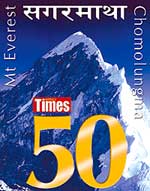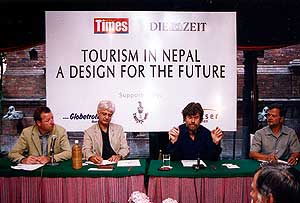 Now that the festivities to mark the Everest anniversary are finally over, the work to lift living standards of the inhabitants of the Himalaya begins anew, and peace is a pre-requisite. That was the message from the Tyrolean climber Reinhold Messner and other Sagarmatha summiteers, academics and tourism experts at a seminar on Wednesday.
Now that the festivities to mark the Everest anniversary are finally over, the work to lift living standards of the inhabitants of the Himalaya begins anew, and peace is a pre-requisite. That was the message from the Tyrolean climber Reinhold Messner and other Sagarmatha summiteers, academics and tourism experts at a seminar on Wednesday.
Messner, with Peter Habeler, became the first person to climb the mountain without oxygen in 1978, and in 1980 became the first to climb the world's highest mountain solo. Messner, who is now a member of the European Parliament and heavily involved in development policy, presented a 'roadmap' for Nepal's progress through tourism: preservation of ethnic diversity, bio-diversity, the environment and spreading the benefits of tourism away from Kathmandu.
"Nepal needs tourism to survive, and tourism needs local culture and the environment to survive," Messner said. He lashed out at Kathmandu-centric mass tourism, the corruption and the ecological erosion that has accompanied trekking and mountaineering in some areas. "Mountaineering is much more than Mt Everest, and Nepal is much more than Mt Everest," he reminded participants.
Messner's formula is a push towards decentralised tourism so that people in hitherto neglected areas can benefit from the jobs and incomes from trekking, especially in western Nepal. "If we don't do thins, I'm afraid we are looking at a social bomb in Nepal," he added.
Responding, economist Pitamber Sharma said tourism accelerates the process of change, and while this could probably not be stopped there should be attempts to minimise the negative impact on cultures and the environment. "Cultures are not timeless, while they change, our basic values should be maintained," Sharma said.
The concerns voiced at the seminar were not new: the need for equitable and sustainable tourism have been talked about for the past three decades. But the very fact that they had to be reiterated so forcefully during the 50th anniversary of the first ascent of Sagarmatha showed how little has been done.
Even so, participants drew attention to the fact that while international media has focussed on trash on Everest, Nepal had several success stories and accomplishments that perhaps had not got as much publicity: the spread of community forestry which has increased forest cover, eco-tourism models like ACAP and Nepal's national park system. While the Maoists never directly attacked trekkers, tourism was indirectly affected by news of the violence. On the other hand, because the benefits of tourism had not been trickling down to the grassroots it had fuelled frustrations that fed the insurgency.
The seminar was organised by the German newspaper, Die Zeit and the Nepali Times at the Dwarikas Hotel. It did not shirk from tackling sensitive issues like the pile-up of expedition excreta on Mt Everest and other mountains. In response to a query about guidelines for defecation at high-altitude, Messner replied: "When you have thousands of people on the mountain like this year, shit piles up. The stuff is deep-frozen, and as it moves down the icefall and the glacier, the melted water could be contaminated." The solution could be carrying down plastic sacks from toilets for disposal down the valley, or zapping fresh faeces with sunlight in special "solar toilets".
Austrian Everest summiteer, Wolfgang Nairz, appealed for the rapid fusion of the Sagarmatha National Park in Nepal and the Qomolungma Nature Reserve on the Chinese side into a transboundary World Heritage Site. At the moment, only the Nepali side has been declared a heritage site.
The over-commercialisation of Everest came up again, and participants felt the need to balance regulation with the freedom of the mountain. "Everest itself is record in itself, so everyone wants to be the first to do something new," Messner admitted. Pretty soon, there will be the first ascent of Mt Everest by a man with his dog, and there may be helicopter ascents from base camp to a helipad on the summit with an oxygen pipeline to the south summit.
Joking aside, there was a proposal to take on Edmund Hillary's idea to declare a moratorium on climbing Mt Everest for ten years so the mountain could "clean itself" and get back its aura. But a problem was immediately pointed out: what if Nepal declares a moratorium and China doesn't. At present, the world's third highest mountain, Kangchendzonga can be climbed from the Nepali north side, but is banned from the south side in Sikkim.  Messner's own idea was to regulate so that only one expedition be allowed on one route per season. This would ensure income from royalty, while preventing over-crowding. Said Messner: "Everest is a strong mountain. But you have to climb it in a clean way, taking risks and surviving, climbing from base camp to the top along a fixed rope is not climbing. We must let the mountain regain its power."
Messner's own idea was to regulate so that only one expedition be allowed on one route per season. This would ensure income from royalty, while preventing over-crowding. Said Messner: "Everest is a strong mountain. But you have to climb it in a clean way, taking risks and surviving, climbing from base camp to the top along a fixed rope is not climbing. We must let the mountain regain its power."
Bernd Loopow of Die Zeit, Kunda Dixit of Nepali Times, Reinhold Messner and Pitamber Sharma at the seminar, 'Tourism in Nepal: A Design for the Future' on Wednesday.


